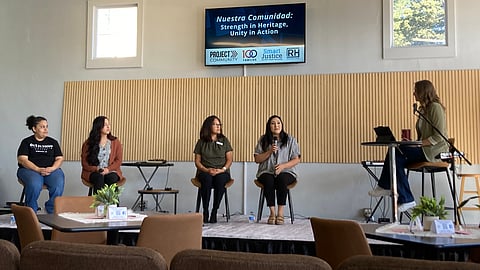
- Home
- Topic Areas
- Newsletter
- Podcast
- 100 Families Initiative
- About
- Connect
- Restore Hope

Community partners filled the Project Community facility for a 100 Families Alliance Meeting honoring Hispanic Heritage Month. The gathering brought together leaders across education, healthcare, justice, faith, and small business to celebrate culture, hear lived experiences, and map out practical steps to better serve Hispanic families.
The 100 Families Initiative is made possible by cross-sector collaboration and uses a technology called HopeHub for secure referrals, care-team coordination, and outcomes tracking.
Hispanic Heritage Month is about honoring traditions, language, and values—and ensuring they are passed on. Leaders across sectors emphasized both the broad impact of this heritage and the shared responsibility of fostering meaningful recognition.
At Clarksville Junior High, Ilda Barrientos, Migrant Clerk and District Interpreter for the Clarksville School District, described students pride for their culture.
Adriana Lacey, Outreach and Education Specialist with River Valley Primary Care Services, spoke to keeping celebrations alive for her grandkids and the wider community: “We are part of the community.” Cultural displays of folklórico dancers were cited as an effective example to create a shared pride and curiosity that opens doors for learning.
From the justice system, Probation Officer Denise Delgado gave historical context to the observance. “Hispanic Heritage Month was established by President Lyndon Johnson. It was originally a week and then expanded into a month because of the increase of Hispanic presence in the United States.”
From the business community, Lupe Torres, owner of Delicioso Cupcakery & Coffee Shop, shared how small businesses can foster trust and visibility. Bilingual, welcoming spaces, she emphasized, matter not only for commerce but also as community hubs where neighbors find encouragement, resources, and referrals.
Asked what unique strengths the Hispanic community brings, panelists were at a consensus.
“Awesome work ethic," they agreed, "Hard work, hard work.” The speakers lifted up family values, respect, and resilience—assets that enrich schools, businesses, churches, and civic life.
Panelists also spoke plainly about barriers families face. Delgado highlighted the fear of legal and family separation.
“There’s actually children in our schools who are losing their parents… It’s fears that no child should have. Just… being a helping hand and being a neighbor to those who are scared is critical. Inclusion starts with listening.”
For Barrientos, the most urgent issue is language access. In her role at the school registrar’s office, she sees daily the shortage of interpreters.
“We’re losing a lot of interpreters.” Without adequate interpretation at DHS, the health unit, and other agencies, parents struggle to engage in their children’s education and services.
Lacey addressed another pressing concern—shifting healthcare policy. She noted how changing rules and funding flows affect eligibility and continuity of care, underscoring the need for constant outreach and coordination so families can access preventive care before crises escalate.
The panel generated concrete, local actions that partners could take immediately. They urged building trusted bridges by pairing with organizations already serving Hispanic families—schools, churches, clinics, and small businesses—to co-design solutions with, not for, the community.
They stressed restoring language access by recruiting and training interpreters, exploring community-service hours for older bilingual teens, and ensuring clinics use professional interpreter lines instead of relying on children in sensitive contexts.
They encouraged partners to simplify communication, translating flyers and forms into plain Spanish so families can understand them without a third person. They also recommended taking information where people already gather—bulletin boards and breakrooms at major employers, schools, churches, and neighborhood businesses like Delicioso.
Finally, they reminded partners to leverage HopeHub. With the new in-app “Refer Participant” button, organizations can send secure, HIPAA-compliant referrals and join care teams to coordinate help across sectors.
Panelists returned again and again to belonging and action.
“Just being aware that these issues are occurring within your community and being the voice that they can’t be for themselves," Delgado says can make all the difference.
Hispanic Heritage Month is more than a calendar entry—it’s a commitment to honor culture, protect families, and ensure equitable access to education, health, justice, and opportunity. The path forward is clear: listen, translate, show up, and build together.
Smart Justice is a magazine, podcast, and continuing news coverage from the nonprofit Restore Hope and covers the pursuit of better outcomes on justice system-related issues, such as child welfare, incarceration, and juvenile justice. Our coverage is solutions-oriented, focusing on the innovative ways in which communities are solving issues and the lessons that have been learned as a result of successes and challenges.
The podcast is available on all major podcasting platforms.
Subscribe to the Smart Justice newsletter.
